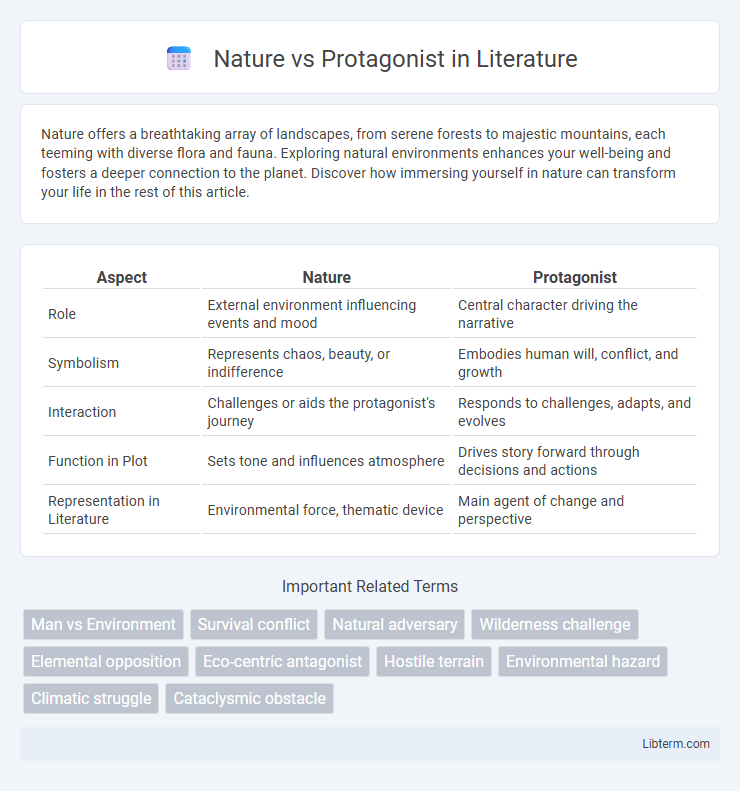Nature offers a breathtaking array of landscapes, from serene forests to majestic mountains, each teeming with diverse flora and fauna. Exploring natural environments enhances your well-being and fosters a deeper connection to the planet. Discover how immersing yourself in nature can transform your life in the rest of this article.
Table of Comparison
| Aspect | Nature | Protagonist |
|---|---|---|
| Role | External environment influencing events and mood | Central character driving the narrative |
| Symbolism | Represents chaos, beauty, or indifference | Embodies human will, conflict, and growth |
| Interaction | Challenges or aids the protagonist's journey | Responds to challenges, adapts, and evolves |
| Function in Plot | Sets tone and influences atmosphere | Drives story forward through decisions and actions |
| Representation in Literature | Environmental force, thematic device | Main agent of change and perspective |
Defining the Nature vs Protagonist Conflict
Nature vs Protagonist conflict arises when a character struggles against natural forces such as storms, animals, or the wilderness, highlighting human vulnerability and resilience. This conflict explores themes of survival, isolation, and the unpredictability of the environment. Classic examples include characters battling harsh weather conditions or untamed landscapes, emphasizing the existential challenge between humanity and nature.
Historical Examples of Nature as an Antagonist
Historical examples of nature as an antagonist often highlight devastating natural disasters such as the 79 AD eruption of Mount Vesuvius, which obliterated the Roman cities of Pompeii and Herculaneum. The 1930s Dust Bowl in the United States exemplified nature's antagonistic force through severe drought and dust storms that ravaged agriculture and displaced thousands of farming families. Furthermore, the 2004 Indian Ocean tsunami demonstrated the catastrophic impact of seismic activity on coastal communities, emphasizing nature's enduring role as a powerful adversary in human history.
Psychological Impact of Facing Natural Forces
Confronting overwhelming natural forces often triggers intense psychological stress characterized by fear, helplessness, and awe, reshaping a protagonist's mental state. This encounter can lead to profound existential reflection, challenging the character's sense of control and survival instincts. The raw power of nature acts as a catalyst for inner transformation, revealing vulnerabilities and resilience within the human psyche.
Nature as a Metaphor in Literature and Film
Nature in literature and film often serves as a powerful metaphor, symbolizing the protagonist's internal struggles and emotional states through external landscapes and natural forces. Storms, forests, and wilderness can mirror chaos, growth, or isolation, accentuating the narrative's tension and character development. This symbolic use of nature deepens thematic exploration by intertwining human experience with environmental elements.
Survival Tactics: Protagonist Strategies Against Nature
The protagonist employs adaptive survival tactics such as sourcing clean water, building shelter from natural materials, and using fire for warmth and protection against wildlife. Skillful navigation through harsh terrains and understanding animal behavior enhance their ability to avoid dangers and secure food. These strategies demonstrate resilience and ingenuity critical for overcoming nature's challenges.
Symbolism of Weather and Landscape
Nature often mirrors the protagonist's internal struggles through symbolic weather patterns and landscapes, using storms to represent turmoil or growth and serene vistas to signify peace or resolution. Harsh climates and rugged terrains symbolize the adversity the protagonist must overcome, while cyclical natural phenomena like seasons reflect the character's evolving emotional states. The interplay between weather and landscape provides a rich, metaphorical backdrop that deepens the narrative's exploration of conflict and transformation.
Inner Transformation Through External Struggle
The protagonist's journey against nature often symbolizes a profound inner transformation, where external struggles with elements like storms or wilderness mirror their psychological growth. Facing harsh environments forces confrontation with fears and limitations, catalyzing resilience and self-discovery. This dynamic showcases how battling nature's obstacles drives deep personal change beyond physical survival.
Human Vulnerability Versus Environmental Power
Human vulnerability manifests in the fragile body and psyche confronted by nature's overwhelming forces such as storms, wildfires, and harsh terrains that dwarf individual strength. Environmental power, characterized by unpredictable weather patterns and ecosystems' vast complexity, constantly challenges human survival and adaptability, reflecting intrinsic tension in the Nature vs Protagonist dynamic. This conflict highlights the limits of human control and resilience against nature's indifferent dominance.
Modern Takes on the Nature vs Protagonist Theme
Modern takes on the Nature vs Protagonist theme explore complex interactions where human characters confront environmental challenges, often highlighting climate change, ecological destruction, and survival instincts. Contemporary narratives depict protagonists struggling with the consequences of technological advancement and environmental neglect, emphasizing the moral and ethical dilemmas of humanity's impact on nature. These stories integrate psychological depth, illustrating the protagonist's internal conflict as they navigate the tension between domination and coexistence with the natural world.
Lasting Lessons from Nature-Inspired Conflicts
Nature-inspired conflicts in literature reveal the protagonist's resilience and adaptability when facing elemental forces, emphasizing the intrinsic bond between humans and the environment. These narratives highlight the enduring lessons of humility, respect, and coexistence, teaching that survival often hinges on understanding and working with natural laws rather than opposing them. Such stories underscore the transformative power of nature as both antagonist and mentor, shaping the protagonist's character and worldview.
Nature Infographic

 libterm.com
libterm.com